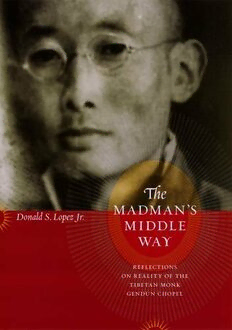
The madman's middle way : reflections on reality of the Tibetan monk Gendun Chopel PDF
274 Pages·2006·2.615 MB·English, Tibetan Standard
Most books are stored in the elastic cloud where traffic is expensive. For this reason, we have a limit on daily download.
Preview The madman's middle way : reflections on reality of the Tibetan monk Gendun Chopel
Description:
Gendun Chopel is considered the most important Tibetan intellectual of the twentieth century. His life spanned the two defining moments in modern Tibetan history: the entry into Lhasa by British troops in 1904 and by Chinese troops in 1951. Recognized as an incarnate lama while he was a child, Gendun Chopel excelled in the traditional monastic curriculum and went on to become expert in fields as diverse as philosophy, history, linguistics, geography, and tantric Buddhism. Near the end of his life, before he was persecuted and imprisoned by the government of the young Dalai Lama, he would dictate the Adornment for Nagarjuna’s Thought, a work on Madhyamaka, or “Middle Way,” philosophy. It sparked controversy immediately upon its publication and continues to do so today. The Madman’s Middle Way presents the first English translation of this major Tibetan Buddhist work, accompanied by an essay on Gendun Chopel’s life liberally interspersed with passages from his writings. Donald S. Lopez Jr. also provides a commentary that sheds light on the doctrinal context of the Adornment and summarizes its key arguments. Ultimately, Lopez examines the long-standing debate over whether Gendun Chopel in fact is the author of the Adornment; the heated critical response to the work by Tibetan monks of the Dalai Lama’s sect; and what the Adornment tells us about Tibetan Buddhism’s encounter with modernity. The result is an insightful glimpse into a provocative and enigmatic workthatwill be of great interest to anyone seriously interested in Buddhism or Asian religions.
See more
The list of books you might like
Most books are stored in the elastic cloud where traffic is expensive. For this reason, we have a limit on daily download.
